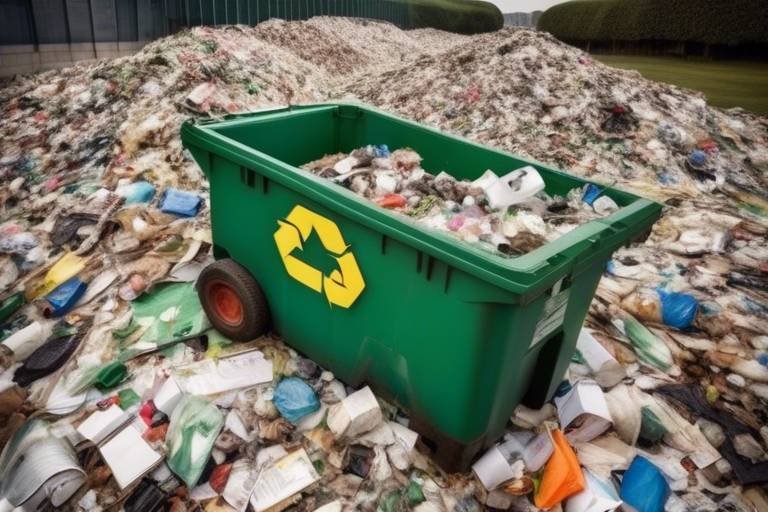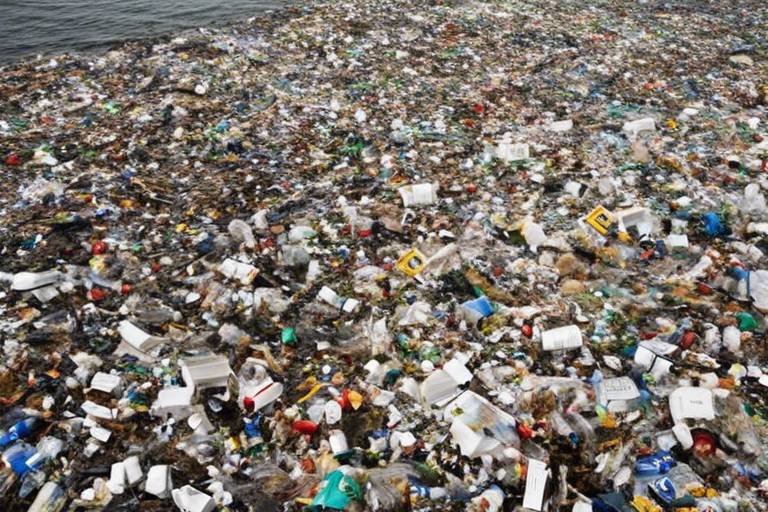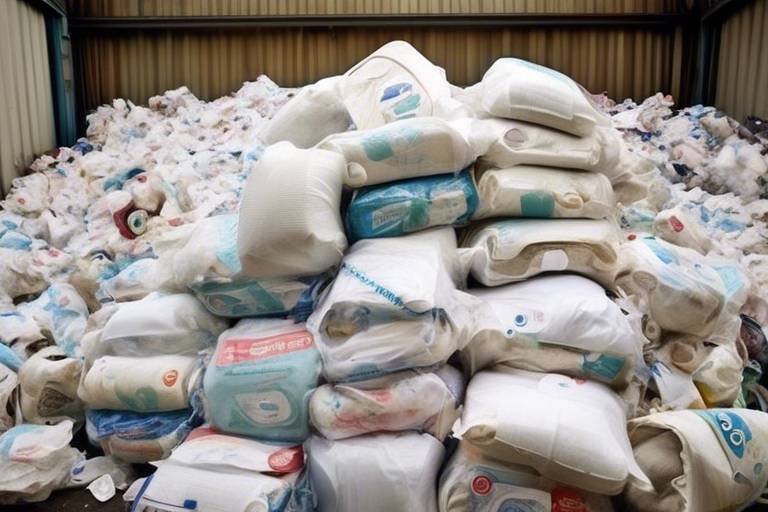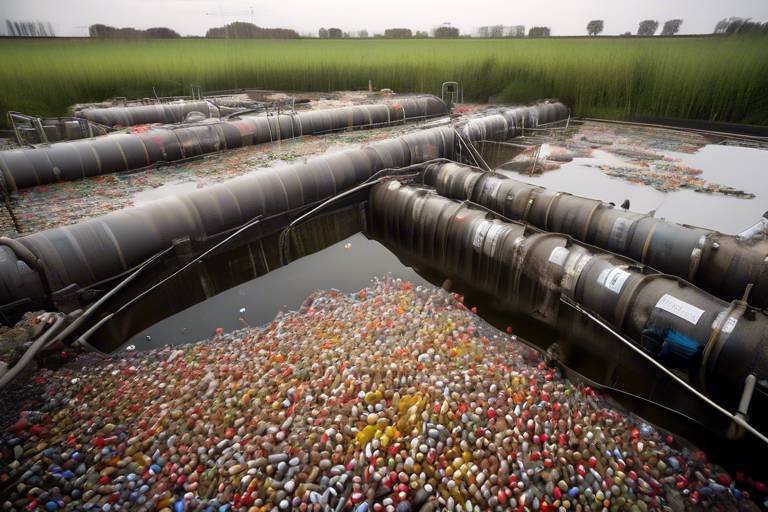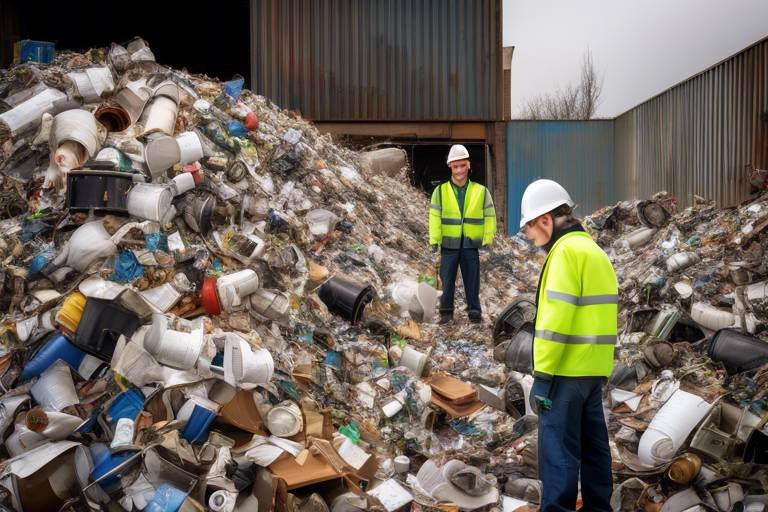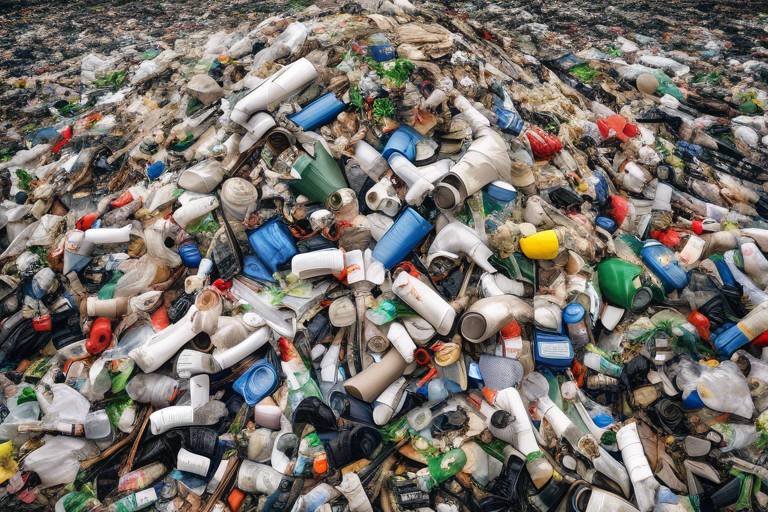The Unexpected Benefits of Recycling
Recycling is often seen as just another chore in our busy lives, but have you ever stopped to think about the unexpected benefits it brings? Beyond the obvious environmental advantages, recycling weaves a rich tapestry of positive impacts that extend into our economy and community health. It's not just about tossing your plastic bottle into the right bin; it's about taking part in a movement that can change the world. So, why should you care? Let’s dive into the myriad ways recycling can enrich our lives and our planet.
One of the most significant benefits of recycling is its profound environmental impact. When we recycle, we are actively reducing the amount of waste sent to landfills. This is crucial because landfills are not just unsightly; they produce harmful greenhouse gases that contribute to climate change. By recycling materials such as paper, glass, and metals, we can significantly minimize pollution levels and lower the emissions that threaten our atmosphere. Imagine a world where our children can breathe cleaner air and drink purer water—this is the future we can create through recycling.
Now, let’s talk dollars and sense. Recycling isn’t just good for the planet; it’s also a smart economic move. The recycling industry generates a wealth of job opportunities, from collection and sorting to processing and manufacturing. This sector is a powerhouse for economic growth, fostering not just new jobs but also innovation in sustainable practices. Communities that embrace recycling often find their local economies thriving as they reduce costs associated with waste disposal and resource extraction. It’s a win-win!
The recycling industry is a vibrant part of the economy, creating numerous employment opportunities. From the moment you drop your recyclable items into the bin, you’re contributing to a system that supports countless jobs. Think about it—those trucks collecting your recyclables, the workers sorting them, and the factories turning them into new products all rely on your participation. This sector plays a crucial role in fostering economic growth and community development, making it essential for a sustainable future.
Many cities have taken the initiative to implement local recycling programs that not only encourage community participation but also create jobs. These programs often engage residents in sustainability efforts, fostering a sense of pride and responsibility. For instance, community clean-up days or educational workshops about recycling can bring people together, strengthening local ties while promoting environmental sustainability. It’s about building a community that cares!
As the demand for recycled materials continues to grow globally, new market opportunities are emerging. Industries are increasingly shifting towards sustainable practices, making recycling vital for economic stability and competitiveness. Countries that invest in recycling infrastructure are positioning themselves as leaders in the global market, showcasing that sustainability can go hand-in-hand with economic prosperity.
Recycling is a crucial tool for conserving valuable resources. By reusing materials that would otherwise end up in landfills, we help preserve our ecosystems and reduce the need for new resource extraction. This practice is like giving Mother Nature a much-needed break, allowing her to recover and flourish. Think of recycling as a way of giving back to the planet, ensuring that future generations inherit a world rich in natural resources.
Recycling also contributes significantly to improved community health. By reducing pollution and promoting cleaner environments, recycling helps create spaces where people can thrive. Healthier communities often see lower healthcare costs and enhanced quality of life for residents. It’s not just about the environment; it’s about the people living in it!
One of the most direct impacts of recycling is the maintenance of cleaner air and water. By minimizing waste and pollution, recycling helps reduce respiratory issues and waterborne diseases associated with environmental degradation. Imagine living in a community where the air is fresh, the water is clear, and everyone feels healthier. That’s the power of recycling at work!
Recycling initiatives often foster community involvement and awareness. When residents engage in sustainability efforts, they cultivate a sense of responsibility and pride in maintaining a healthy environment for all. Programs that encourage recycling can lead to community events, educational workshops, and volunteer opportunities, all of which strengthen social bonds and create a culture of sustainability.
- What can I recycle? Most items such as paper, cardboard, glass, and certain plastics can be recycled. Always check your local guidelines!
- How does recycling help the economy? Recycling creates jobs, reduces waste disposal costs, and conserves resources, contributing to economic growth.
- Can recycling really make a difference? Absolutely! Every item recycled reduces landfill waste, conserves resources, and lowers pollution.

Environmental Impact
Recycling is not just a trendy buzzword; it’s a powerful tool that can significantly reshape our planet's future. When we recycle, we are actively participating in a global movement aimed at reducing waste in landfills. Imagine a world where our trash doesn’t end up suffocating the earth, but instead, is transformed into new products. By recycling materials like paper, plastics, and metals, we can conserve precious natural resources that are becoming increasingly scarce. This not only helps in preserving ecosystems but also minimizes the need for new resource extraction, which can be a destructive process.
Furthermore, recycling plays a crucial role in pollution reduction. Every time we recycle, we are helping to lower greenhouse gas emissions, which are a significant contributor to climate change. For instance, producing recycled aluminum uses 95% less energy compared to creating it from raw materials. This energy conservation leads to a decrease in fossil fuel consumption, which is vital for a healthier planet. The less we rely on fossil fuels, the fewer pollutants are released into the air, contributing to cleaner skies and a more vibrant atmosphere.
To put this into perspective, consider the following statistics:
| Material | Energy Savings from Recycling |
|---|---|
| Aluminum | 95% |
| Paper | 60% |
| Glass | 30% |
| Plastic | 70% |
As you can see from the table, recycling various materials can lead to substantial energy savings. This not only helps in conserving resources but also reduces the overall carbon footprint of our communities. When we think about the environmental impact of our choices, it’s essential to recognize how recycling can lead to a more sustainable lifestyle. It’s like planting seeds for future generations; every small action we take today will blossom into a healthier, more sustainable tomorrow.
Moreover, recycling has a ripple effect on our surroundings. By reducing the volume of waste that ends up in landfills, we are also decreasing the chances of harmful substances leaching into our soil and waterways. This leads to a healthier ecosystem, where wildlife can thrive, and plants can grow without the threat of toxic pollution. In essence, recycling is not just an act of disposal; it's a commitment to nurturing the environment.
In conclusion, the environmental impact of recycling is profound and multifaceted. By adopting recycling practices, we are not only reducing waste but also conserving energy, preserving natural resources, and protecting our ecosystems. It’s a win-win situation that benefits everyone on this planet. So, the next time you toss something in the recycling bin, remember that you’re not just getting rid of a product; you’re playing a part in a much larger movement towards a sustainable future.

Economic Advantages
When we talk about recycling, we often think about the environmental benefits, but did you know it also has a significant impact on the economy? Recycling is not just about saving the planet; it's also about boosting local economies and creating jobs. In fact, the recycling industry is a powerhouse of economic activity that can stimulate growth and provide a plethora of opportunities for communities. By turning waste into resources, we can create a sustainable loop that benefits everyone involved. Isn't that a win-win situation?
One of the most compelling economic advantages of recycling is the job creation it fosters. The recycling industry encompasses a wide range of activities, from collection and sorting to processing and manufacturing. Each step in this process requires skilled labor, which means that as recycling efforts increase, so do employment opportunities. According to recent studies, for every job in the recycling sector, approximately 1.17 jobs are created in the manufacturing sector. This means that recycling not only helps in waste management but also plays a crucial role in fostering economic growth.
Moreover, local initiatives are making a significant impact. Many cities have implemented robust recycling programs that encourage community participation while simultaneously creating jobs. These initiatives not only help to bolster local economies but also promote environmental sustainability. For instance, a city that invests in a comprehensive recycling program can see a reduction in waste disposal costs while generating revenue from the sale of recyclable materials. This creates a cycle of economic benefits that can be reinvested into the community.
| Economic Impact | Details |
|---|---|
| Job Creation | Every job in recycling creates 1.17 additional jobs in manufacturing. |
| Cost Reduction | Recycling reduces costs associated with waste disposal and resource extraction. |
| Revenue Generation | Communities can earn money from selling recyclable materials. |
On a broader scale, the global market trends indicate a growing demand for recycled materials. As industries shift towards sustainable practices, the need for recycled products is becoming increasingly vital. This shift not only opens up new market opportunities but also enhances economic stability and competitiveness on a global scale. Companies are now recognizing that incorporating recycled materials into their supply chains can lead to reduced costs and improved sustainability, which is crucial in today's eco-conscious market.
In conclusion, the economic advantages of recycling are manifold. From job creation to cost savings and enhanced community engagement, recycling is an effective strategy for fostering economic growth and sustainability. So next time you toss that bottle into the recycling bin, remember, you’re not just helping the environment; you’re also contributing to a robust economy. Isn’t it amazing how one small action can lead to such significant benefits?
- How does recycling create jobs? Recycling creates jobs through various processes, including collection, sorting, processing, and manufacturing of recycled materials.
- What are the economic benefits of local recycling programs? Local recycling programs can reduce waste disposal costs, generate revenue from recyclable materials, and create job opportunities.
- How does recycling impact global markets? The growing demand for recycled materials drives market opportunities and encourages industries to adopt sustainable practices.

Job Creation
The recycling industry is a powerhouse when it comes to job creation, offering a vast array of employment opportunities across various sectors. From the moment recyclables are collected from curbside bins to the intricate processes of sorting, processing, and ultimately manufacturing new products, each step in the recycling chain requires a dedicated workforce. It's fascinating to think that every time you toss a plastic bottle into a recycling bin, you're contributing to a system that supports jobs and livelihoods.
According to recent studies, the recycling sector supports over a million jobs in the United States alone, and this number continues to grow as more communities adopt sustainable practices. These jobs aren't just limited to the big players; local businesses and startups are also tapping into this green economy. The beauty of this industry is that it encompasses a range of roles, including:
- Collection and Transportation: Workers who gather recyclables from homes and businesses.
- Sorting and Processing: Employees who sort materials at recycling facilities and prepare them for manufacturing.
- Manufacturing: Workers who use recycled materials to create new products, from clothing to construction materials.
- Research and Development: Innovators developing new recycling technologies and processes.
Moreover, the ripple effect of job creation in the recycling industry extends to related sectors as well. For instance, as demand for recycled materials increases, manufacturers need to hire more workers to meet that demand, thus creating additional jobs in production and logistics. This interconnectedness not only strengthens local economies but also fosters community resilience.
Local initiatives play a crucial role in job creation within the recycling sector. Many cities have launched programs aimed at increasing recycling rates, which often include hiring local residents for collection and processing roles. These initiatives not only provide employment but also engage the community in sustainable practices, creating a sense of ownership and responsibility towards environmental stewardship.
The global market for recycled materials is booming, driven by a growing demand for sustainable practices across industries. As companies worldwide shift towards greener alternatives, the need for skilled workers in the recycling field is more critical than ever. This shift presents a unique opportunity for job seekers to enter a field that not only promises economic stability but also contributes positively to the environment.
In conclusion, the job creation potential of the recycling industry is immense and multifaceted. By embracing recycling, we are not only helping to protect our planet but also investing in our communities and creating a more sustainable future for everyone. So, the next time you recycle, remember that you're part of a larger movement that supports jobs and builds a healthier economy.

Local Initiatives
Local recycling initiatives are often the heartbeat of community sustainability efforts. These programs not only encourage residents to participate in recycling but also create a sense of ownership and responsibility towards the environment. Imagine a neighborhood where everyone is actively involved in reducing waste—this is the vision that local initiatives strive to achieve. By providing accessible recycling bins, hosting educational workshops, and organizing community clean-up events, cities can significantly boost participation rates.
One of the most effective strategies for promoting recycling at the local level is through collaboration. Local governments can partner with schools, businesses, and non-profit organizations to create programs that resonate with residents. For instance, many cities have introduced incentive programs that reward households for recycling more effectively. These initiatives not only motivate individuals to recycle but also foster a spirit of competition among neighbors, making recycling a fun and engaging activity.
Additionally, local initiatives often focus on specific materials that are commonly discarded but can be recycled. For example, many communities have launched campaigns targeting plastic bags, electronics, and hazardous waste. By providing designated drop-off locations and clear guidelines on what can and cannot be recycled, these programs simplify the recycling process and encourage participation.
Moreover, the impact of local recycling initiatives can be measured in various ways. For instance, a city that implements a robust recycling program might see a significant decrease in landfill waste over time. This can be illustrated in the following table:
| Year | Waste Diverted from Landfill (tons) | Recycling Rate (%) |
|---|---|---|
| 2020 | 5,000 | 25 |
| 2021 | 7,500 | 35 |
| 2022 | 10,000 | 45 |
As you can see, with the right initiatives in place, communities can experience a remarkable shift towards more sustainable waste management practices. Ultimately, local recycling initiatives are not just about reducing waste; they are about building a stronger, more engaged community that values sustainability and environmental stewardship.
- What types of materials can be recycled in local programs? Most local recycling programs accept paper, cardboard, glass, metals, and certain plastics. It's best to check with your local program for specific guidelines.
- How can I get involved in local recycling initiatives? You can participate by joining community clean-up events, volunteering for local organizations, or simply by recycling at home and encouraging your neighbors to do the same.
- Are there any incentives for recycling? Many communities offer rewards programs or discounts on utility bills for households that actively participate in recycling efforts.

Global Market Trends
The recycling industry is not just about sorting bottles and cans; it’s a dynamic sector that is evolving rapidly in response to global demands. As more companies recognize the importance of sustainability, the demand for recycled materials continues to surge. This shift is not merely a trend but a fundamental change in how businesses approach resource management. The increasing scarcity of natural resources has prompted industries to look toward recycling as a viable solution. In fact, many manufacturers are now prioritizing recycled materials over virgin resources, leading to a robust market for recycled goods.
One of the most exciting aspects of these global market trends is the emergence of new technologies that enhance recycling processes. Innovations in sorting and processing technologies are making it easier and more efficient to recycle materials. For example, advancements in artificial intelligence and machine learning are streamlining the sorting process, allowing for higher purity levels in recycled materials. This means that industries can produce high-quality products from recycled inputs, which is a game-changer for sustainability.
Additionally, the rise of circular economies is reshaping how businesses operate. In a circular economy, the focus is on designing products with their entire lifecycle in mind, ensuring that materials are reused and recycled as much as possible. This approach not only conserves resources but also reduces waste significantly. Companies that adopt circular economy principles are finding themselves at a competitive advantage, as consumers increasingly prefer brands that demonstrate environmental responsibility.
Moreover, governments worldwide are beginning to implement stricter regulations regarding waste management and recycling. These policies are driving businesses to adopt more sustainable practices, creating a ripple effect across various industries. As a result, we are witnessing a shift in investment towards recycling technologies and infrastructure, which is expected to grow exponentially in the coming years. According to recent studies, the global recycling market is projected to reach $500 billion by 2027, reflecting the growing recognition of recycling as a crucial component of economic sustainability.
In conclusion, the global market trends in recycling are indicative of a larger movement towards sustainability. As businesses, governments, and consumers embrace the importance of recycling, we are not only conserving resources but also creating a healthier planet. The future looks bright for the recycling industry, and it’s an exciting time for those involved in this vital sector.
- What materials can be recycled? Most common materials include paper, cardboard, glass, metals, and certain plastics. Always check local guidelines for specific recycling rules.
- How does recycling benefit the economy? Recycling creates jobs, reduces waste disposal costs, and conserves resources, contributing to economic growth.
- Can recycling help combat climate change? Yes, recycling reduces greenhouse gas emissions by minimizing the need for new resource extraction and processing.
- What is a circular economy? A circular economy focuses on reusing and recycling materials to create a sustainable system that minimizes waste.

Resource Conservation
When we think about recycling, we often picture bins filled with plastic bottles and newspapers. But the true magic of recycling lies in its ability to conserve valuable resources that our planet desperately needs. Imagine a world where forests are not cut down for paper, where metals are not mined from the earth, and where we can keep our oceans cleaner. By recycling, we can make this vision a reality. When materials are reused, we significantly reduce the demand for new raw materials, which in turn helps to preserve our precious ecosystems.
Recycling not only saves resources but also minimizes the energy consumption associated with producing new products. For instance, creating aluminum from recycled materials uses about 95% less energy compared to producing it from raw bauxite ore. This is akin to taking a long road trip and opting to carpool instead; it saves fuel and reduces emissions. In this way, recycling becomes a powerful tool in our fight against climate change.
Furthermore, the conservation of resources through recycling has a ripple effect on our economy. By reducing the need for new materials, we lower the costs associated with extraction, processing, and transportation. This means that businesses can save money, and those savings can be passed down to consumers. It's a win-win situation!
To illustrate the impact of recycling on resource conservation, consider the following table:
| Material | Energy Savings (%) | Natural Resource Saved |
|---|---|---|
| Aluminum | 95 | Bauxite Ore |
| Paper | 60 | Wood Pulp |
| Glass | 30 | Sand |
| Plastic | 70 | Crude Oil |
As you can see, the benefits of recycling extend far beyond just reducing waste. By conserving natural resources, we are not only protecting the environment but also ensuring a sustainable future for generations to come. Every time you recycle, you are making a conscious choice to support a healthier planet and a more sustainable economy.
- What materials can be recycled? Most common materials include paper, cardboard, glass, plastics, and metals. Always check with local recycling guidelines for specifics.
- How does recycling help the environment? Recycling reduces waste in landfills, conserves natural resources, and decreases pollution levels.
- Can recycling create jobs? Yes! The recycling industry generates numerous jobs in collection, processing, and manufacturing sectors.
- What are the economic benefits of recycling? Recycling reduces waste disposal costs and stimulates local economies by creating jobs and reducing the need for new resource extraction.

Community Health Benefits
This article explores the various advantages of recycling, highlighting its impact on the environment, economy, and community health while uncovering some lesser-known benefits that can inspire individuals to adopt sustainable practices.
Recycling significantly reduces waste in landfills and conserves natural resources. By recycling materials, we can minimize pollution and lower greenhouse gas emissions, contributing to a healthier planet for future generations.
Recycling can stimulate the economy by creating jobs in the recycling and manufacturing sectors. It also reduces costs associated with waste disposal and resource extraction, making it a financially sound practice for communities.
The recycling industry generates numerous employment opportunities, from collection and sorting to processing and manufacturing. This sector plays a crucial role in fostering economic growth and community development.
Many cities have implemented local recycling programs that not only encourage community participation but also create jobs. These initiatives help bolster local economies while promoting environmental sustainability.
The demand for recycled materials is growing globally, creating new market opportunities. As industries shift towards sustainable practices, recycling becomes increasingly vital for economic stability and competitiveness.
Recycling conserves valuable resources by reusing materials that would otherwise be discarded. This practice helps preserve ecosystems and reduces the need for new resource extraction, fostering a more sustainable future.
Recycling contributes significantly to improved community health by reducing pollution and promoting cleaner environments. When we recycle, we not only lessen the burden on landfills but also help to ensure that our air and water remain as pristine as possible. This leads to a ripple effect of positive outcomes for public health. For instance, cleaner air directly correlates with a decrease in respiratory illnesses, while cleaner water reduces the prevalence of waterborne diseases. Isn't it fascinating how one action can have such far-reaching effects?
Moreover, engaging in recycling initiatives often fosters a sense of community. When residents come together to participate in local recycling programs, they develop a shared responsibility towards their environment. This collective effort not only enhances community pride but also encourages individuals to adopt other sustainable practices. Just think about it: when your neighbors are actively involved in keeping the community clean, it inspires you to do the same. This creates a culture of sustainability that benefits everyone.
By minimizing waste and pollution, recycling plays a crucial role in maintaining cleaner air and water. The less waste we produce, the fewer harmful emissions are released into our atmosphere. This directly impacts public health, reducing respiratory issues and other health problems associated with environmental degradation. For example, studies have shown that communities with robust recycling programs often report lower instances of asthma and other air quality-related health concerns. The connection between a clean environment and our health is undeniable.
Recycling initiatives often foster community involvement and awareness. Programs that encourage residents to recycle not only educate them about the importance of sustainability but also motivate them to take action. Engaging residents in sustainability efforts promotes a sense of responsibility and pride in maintaining a healthy environment for all. This engagement can take many forms, from local clean-up events to educational workshops. The more involved we are, the more we realize the impact of our actions on our health and well-being.
- What are the most common materials that can be recycled? Most communities accept paper, cardboard, glass, plastics, and metals for recycling.
- How does recycling help the economy? Recycling creates jobs, reduces waste disposal costs, and conserves resources, leading to economic growth.
- Can recycling improve community health? Yes, by reducing pollution and fostering cleaner environments, recycling contributes to better public health outcomes.
- What can I do to promote recycling in my community? You can participate in local recycling programs, educate others about the benefits of recycling, and advocate for better recycling policies.

Cleaner Air and Water
When we think about the benefits of recycling, we often focus on the tangible aspects like reducing waste and conserving resources. However, one of the most profound impacts recycling has is on our air and water quality. Imagine living in a world where the air is crisp and the water is pure—sounds like a dream, right? Well, recycling is a step towards making that dream a reality. By diverting materials from landfills, we can significantly reduce the amount of pollution that seeps into our environment.
Every time we recycle, we are essentially taking a stand against the harmful emissions generated by waste incineration and the toxic leachate produced in landfills. This is crucial because poor air quality can lead to respiratory issues and other serious health problems, while contaminated water sources can cause a myriad of diseases. In fact, studies have shown that areas with high recycling rates tend to have lower levels of air pollutants and cleaner water supplies. It's a win-win situation!
Furthermore, recycling helps to conserve natural habitats that are often destroyed during resource extraction processes. By reducing the need for new materials, we are not only preserving ecosystems but also protecting the water sources that depend on these ecosystems. When forests are cut down or wetlands are drained, the natural filtration systems that keep our water clean are compromised. Thus, recycling plays a vital role in maintaining the balance of our environment.
To illustrate the significance of this relationship, consider the following table that highlights the reduction in pollutants achieved through recycling:
| Material Recycled | Reduction in Air Pollution (in tons) | Reduction in Water Pollution (in tons) |
|---|---|---|
| Aluminum | 1.1 | 0.5 |
| Paper | 0.6 | 0.3 |
| Glass | 0.2 | 0.1 |
As you can see, recycling various materials leads to a significant decrease in both air and water pollution. This not only enhances the quality of life for residents but also contributes to a healthier planet. Moreover, when communities engage in recycling programs, they often experience a newfound sense of pride and responsibility towards their environment. This collective effort fosters a culture of sustainability that can ripple through generations.
So, the next time you toss a bottle in the recycling bin, remember that you are not just reducing waste; you are actively contributing to cleaner air and water for yourself and your community. Every small action counts, and together, we can create a cleaner, healthier world.
- What materials can be recycled? Most common items include paper, cardboard, glass, plastics, and metals. Always check local guidelines for specifics.
- How does recycling help the economy? Recycling creates jobs, reduces costs associated with waste management, and generates revenue from selling recycled materials.
- Can recycling really make a difference? Absolutely! Recycling significantly minimizes pollution, conserves resources, and promotes a healthier environment.

Community Engagement
Community engagement is a powerful catalyst for change, especially when it comes to recycling initiatives. When residents come together to participate in sustainability efforts, they not only contribute to a healthier environment but also foster a sense of belonging and responsibility. Imagine a neighborhood where everyone is actively involved in keeping the streets clean and the parks green; it’s a ripple effect that starts small but can lead to significant transformations.
One of the most exciting aspects of community engagement in recycling is the opportunity for residents to collaborate on local projects. For instance, many communities organize clean-up days, recycling drives, and educational workshops that bring people together. These events not only raise awareness about the importance of recycling but also provide a platform for neighbors to connect and share ideas. When individuals feel they have a stake in their community, they’re more likely to engage in sustainable practices.
Moreover, local schools and organizations often play a pivotal role in promoting recycling through programs tailored for children and families. Educational initiatives can include:
- School recycling competitions that encourage students to collect and sort materials.
- Workshops on how to upcycle everyday items into useful products.
- Community fairs that showcase local recycling resources and services.
These activities not only educate participants but also instill a sense of pride in their contributions to environmental sustainability. As families engage in recycling together, they pass down values of stewardship and care for the planet to the next generation, creating a legacy of environmental responsibility.
Furthermore, community engagement in recycling can lead to the establishment of local partnerships. Collaborations with businesses, non-profits, and local governments can enhance recycling efforts significantly. For example, a local grocery store might partner with a community group to set up a collection point for recyclable materials, or a non-profit might provide resources for educational campaigns. These partnerships amplify the impact of recycling initiatives and create a network of support that benefits everyone involved.
In conclusion, engaging the community in recycling efforts is not just about reducing waste; it’s about building connections, fostering pride, and creating a culture of sustainability. When individuals see the tangible benefits of their contributions, such as cleaner neighborhoods and improved public health, they are more likely to remain committed to these practices. It’s a collective journey toward a greener future, and every small effort counts.
Here are some common questions regarding community engagement in recycling:
- How can I get involved in local recycling initiatives? Check with your local government or community center for upcoming events and programs.
- What are some effective ways to educate my community about recycling? Organize workshops, distribute flyers, or use social media to spread awareness.
- Are there any resources available for starting a recycling program in my neighborhood? Many environmental organizations offer toolkits and guidance for setting up community programs.
Frequently Asked Questions
- What are the main environmental benefits of recycling?
Recycling plays a crucial role in reducing landfill waste, conserving natural resources, and minimizing pollution. By recycling materials, we can significantly lower greenhouse gas emissions, which is vital for combating climate change and ensuring a healthier planet for future generations.
- How does recycling contribute to the economy?
Recycling stimulates the economy by creating jobs in various sectors, including collection, sorting, processing, and manufacturing. It also helps reduce costs associated with waste disposal and resource extraction, making it a financially sound practice for communities and fostering economic growth.
- Can recycling create local job opportunities?
Absolutely! Many cities have implemented local recycling programs that encourage community participation while generating employment opportunities. These initiatives not only help the environment but also bolster local economies and promote sustainable practices.
- What is the impact of recycling on community health?
Recycling contributes to improved community health by reducing pollution and promoting cleaner environments. This leads to cleaner air and water, which directly impacts public health by reducing respiratory issues and waterborne diseases associated with environmental degradation.
- How does recycling foster community engagement?
Recycling initiatives often bring communities together, encouraging residents to participate in sustainability efforts. This engagement fosters a sense of responsibility and pride, making individuals feel more connected to their environment and motivated to maintain a healthier community.
- What are some lesser-known benefits of recycling?
Besides the well-known environmental and economic advantages, recycling also helps preserve ecosystems by reducing the need for new resource extraction. It promotes innovation in manufacturing processes and opens up new market opportunities globally as industries shift towards sustainable practices.






